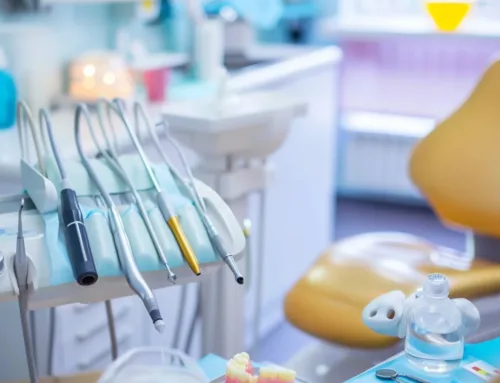Understanding the Causes, Treatment, & Prevention of Dental Abscesses
Patients who experience the sudden onset of pain in a tooth or in the gums, and there is no immediate or apparent cause, may have developed a condition known as a dental abscess. Abscesses in the teeth and gums are conditions that must be promptly treated, for if they are ignored or left untreated can develop into much more serious problems at a rapid rate. Taking action quickly is essential in treating dental abscesses.
Maintaining a good oral healthcare routine isn’t just about making sure your teeth are always looking their best. Keeping your teeth and gums clean, healthy, and strong is vital in preventing a wide range of serious dental health problems from developing. Warding off tooth decay and fighting plaque build-up with proper tooth brushing and flossing, along with a regular schedule of professional tooth cleaning checkups, helps to reduce the chance of bacterial infections forming in the teeth and gums. If left unchecked, bacterial infections in the mouth can progress in severity and produce what is known as a dental abscess.
What Is a Dental Abscess?
Dental abscesses are accumulations of bacterial by-products and waste material that is created as bacteria feed and multiply. These by-products build up over time in the form of pus, and when trapped inside a gum pocket or inside a tooth, can result in a variety of symptoms. The most common sign of a dental abscess is the sudden onset of pain and swelling in a specific area of the mouth. This pain is more intense when the pressure of biting and chewing is exerted on the teeth in the affected area. Other signs include foul breath, fever, increased sensitivity to high or low temperatures, and possibly difficulty in swallowing.
Oftentimes dental abscesses are incorrectly referred to as bacterial infections. By definition, abscesses are one of the effects caused by bacterial infections, but are not themselves an infection. There are also different types of dental abscesses, which are categorized based on the type of infection that causes the abscess, and where exactly the abscess forms in the teeth or mouth.
The 3 Types of Dental Abscesses
Dental abscesses are sorted into one of three distinct categories, each defined by the specific location of the abscess.
- Abscesses in the Gum Tissue – If the abscess is contained entirely inside the soft tissue of the gums, it is known as a Gingival Abscess.
- Abscesses at the Root of the Tooth – If the abscess forms around the base of the tooth at the root and inside the supporting bone tissues, it is referred to as a Periodontal Abscess.
- Abscesses in the Tooth Pulp – When the abscess forms inside the softer inner material of the tooth itself, usually at the root of the tooth, this is known as a Periapical Abscess.
What Causes Dental Abscesses to Form?
As we eat and drink, saliva is produced and mixed in with the chewed-up foods, starting off the digestive process. However, this mixture of saliva and food also results in the growth of bacteria in our mouths. This bacteria then latches onto the teeth and gums and starts to accumulate in deposits of plaque, a soft and sticky film that builds up in the gaps between teeth and around the gum line. Brushing and flossing works to break the bond between the plaque and the teeth, allowing it to be removed and rinsed away.
If bacteria in the mouth is not properly cleaned away and removed on a regular basis, it can multiply at an increasingly rapid rate and eventually lead to an infection of the gums and teeth. The most common type of bacterial infection of the mouth is periodontitis, also known as gum disease. When the infection progresses, the by-products of bacterial multiplication increase and eventually work their way into the gaps and spaces in between the teeth and in the gums. As this process continues, and more material builds up, an abscess will form, leading to pain, swelling, and many of the other symptoms described earlier.
In the case of periapical abscesses that form inside the tooth material itself, the bacteria has managed to work their way through microscopic holes in the teeth and cavities caused by tooth decay. Once inside, the bacteria continue to infect the inner tooth pulp, eventually leading to the formation of an abscess within the tooth. The accumulation of pus inside the tooth results in intense pain when pressure is applied to the tooth, and is usually accompanied by continual soreness and throbbing dull pain in the surrounding area.
Why Is It Important to Get Treatment for Dental Abscesses as Soon as Possible?
Having a dental abscess treated promptly is critical to prevent the associated bacterial infection from worsening. Infections that are allowed to progress can spread to other surrounding areas or parts of the body. In severe cases, the infection can seep into the bloodstream, causing a condition known as sepsis. This is a life-threatening emergency situation, as it can spread the infection to vital organs such as the lungs, heart, or brain. The seriousness of this cannot be overstated, so if you are experiencing any of the symptoms associated with a dental abscess, seek attention as quickly as possible.
In addition to avoiding the risks of more severe infection complications, early treatment also helps the patient minimize the likelihood that an extraction may be needed. This is particularly relevant in the case of periapical abscesses. In the event that this type of tooth abscess has grown too large to effectively be treated, there’s a good chance that the dentist will be required to extract the tooth to properly deal with the problem. Losing teeth can have many negative long-term health effects, including impacting the person’s diet and nutrition, reduced self-confidence, alterations to speech patterns, and loss of bone density in the jaw.
For these reasons and more, it’s of utmost importance for anyone who is experiencing any unexplained discomfort or pain in the teeth or jaw to obtain care right away. Many abscesses can be treated easily, and the patient will recover quickly. Depending on the nature of the abscess, and the severity of the case, there are several treatment options available to dentists.
How Are Dental Abscesses Treated?
Treating a typical abscess usually starts with addressing the source of the infection. Antibiotics will likely be prescribed to cure the infection and prevent the condition from worsening. The abscess itself will be treated by draining the accumulated pus and fluid from the area. In the case of gingival abscesses, this will be done by making a small incision in the area, draining the material, and then cleaning out the affected tissue.
Periodontal abscesses that form around the base of the tooth at the root will be drained in a similar fashion to a gingival abscess, but will also include additional steps after the pus has been removed. A thorough root planning and descaling will be performed to clean out any bacteria build-up from below the gum line, and the affected area will be closely monitored at subsequent checkups to spot any possibility of recurring infections.
Periapical abscesses require more extensive procedures due to their presence inside the teeth. Root canal procedures involve drilling a small hole in the tooth to allow the abscess to drain and have any damaged tooth pulp removed. The empty space in the tooth is then filled in to help prevent any future infections from occurring. However, in some cases where the abscess has become more severe, the tooth may need to be removed entirely. Usually, the tooth is then replaced with an artificial dental implant or dental bridge, depending on which is determined to be the best option for the patient.
What Can Be Done to Prevent Abscesses from Forming in the Mouth, Teeth, and Gums?
Preventing abscesses from forming depends entirely on preventing the onset of bacterial infections that cause them. This starts with diligently following a sensible at-home oral care routine. Toothbrushing using the proper technique and a good quality toothpaste is essential. Flossing regularly is one of the best ways to significantly lower the risk of developing gum disease. Use of antibacterial oral rinses helps bolster the effects of brushing and flossing, and works to inhibit bacterial growth in the mouth.
In addition to keeping your mouth clean at home, it’s also vital that you follow the recommended schedule of dental checkups and hygiene appointments. Your dentist and hygienist will keep a very close eye on the state of your dental health and inform you of any concerns they may have. Professional tooth cleaning treatments, descaling, polishing and fluoride applications are all important preventive measures. Obtaining up-to-date x-rays at regular intervals will give your dentist the necessary insight to spot potential issues before they have a chance to progress.
Stop Dental Abscesses before They Can Start & Book Your Next Appointment at Georgian Dental
If you suspect that you may have a dental abscess, or are noticing some of the associated symptoms, now is the time to get your mouth checked out & assessed by the team here at Georgian Dental. We will be glad to arrange for your next appointment at the earliest opportunity and ensure you get the proper care. Contact us now to book your visit. We look forward to seeing you soon!
Appointment Request
If you’re interested in any of our procedures, and would like to meet with one of our dentists to discuss options, costs and get additional information, complete this short form and we’ll give you a call to arrange for a no-obligation appointment at our Barrie clinic.










